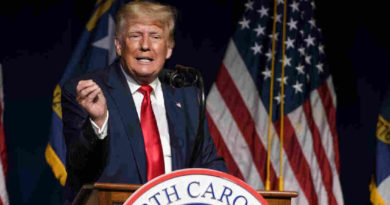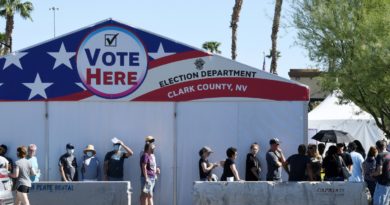Texas AG Paxton’s $2.2M voter fraud unit closed three cases in 2021. GOP lawmakers still boosted its budget.

Texas Republican Attorney General Ken Paxton has been one of former President Donald Trump’s most reliable allies in spreading the myth of widespread voter fraud, particularly in the 2020 election, and frequently boasts that few states are as vigilant.
His office’s election integrity unit added two lawyers to the team in the last year, bringing it up to six staffers total, and worked more than 20,000 hours between Oct. 2020 and Sept. 2021. Its budget, meanwhile, ratcheted up from $1.9 million to $2.2 million during that time.
Yet records from the office show that the unit closed just three cases this year, down from 17 last year, and opened seven new ones. That includes the newly created unit focused on the 2021 local elections, which has yet to file a single case.
“This is an exorbitant amount of money that has resulted in no benefit for the average Texan,” said Austin Evers, executive director of American Oversight, a left-leaning nonprofit government watchdog that regularly files public information requests and files suits to force compliance with those requests. The organization shared some records it obtained from the Texas attorney general’s office with Hearst Newspapers for this report; others were obtained independently by Hearst Newspapers.
Evers added: “Taxpayers are funding a political stunt meant to fuel the false claim of a stolen election and justify voting restrictions.”
The scant caseload comes after Texas Republican lawmakers insisted a 2020 election audit was necessary and passed a sweeping elections overhaul bill loaded with voting restrictions that Democrats have warned will have a disproportionate effect on already-marginalized voters.
Paxton’s office has not uncovered any evidence of voter fraud in 2020 beyond isolated incidents affecting a handful of votes in an election in which more than 11 million Texans cast ballots.
Republican Gov. Greg Abbott, under pressure by former president Donald Trump, initiated reviews of election processes across the state in the fall.
Paxton’s office did not respond to a request for comment for this story, but in a podcast his office produced in November 2020 about voter fraud, Paxton blamed low resources for the election integrity unit’s output.
“I don’t think anybody knows the degree to which it happens because even our office who probably prosecutes more election fraud than anyone else in the country … We don’t have enough resources to cover all election fraud. So it’s really hard to know how large an issue this is because very few states put any resources in to actually detect or prosecute voter fraud.”
It’s a point he’s made often before, though he’s never offered specifics as to what kind of staffing or funding he would find sufficient.
Richard L. Hasen, an election law professor at the University of California Irvine, said there’s a more likely explanation, noting that Paxton, who is running for re-election, has “every incentive,” politically speaking, to vigorously go after voter fraud, as it’s an issue that energizes his party’s base.
“He’s finding very little of it despite spending a lot of money and using a lot of resources looking for it,” Hasen said. “The reason is not that such fraud is too hard to find. Those that commit voter fraud tend not to be brain surgeons. The reason he’s not finding a lot of it is because voter fraud is rare.”
Multiple academic studies and journalistic reviews have uncovered no evidence of widespread voter fraud, nor did a wide-ranging investigation of election fraud in 2020 conducted by the U.S. Justice Department.
After Texas’ own director of elections Keith Ingram testified to lawmakers in March that the 2020 election was “smooth and secure,” the Secretary of State failed to receive confirmation of her appointment by the Republican-majority state Senate and was forced to step down.
In one of the most comprehensive reviews to date, an AP analysis this month reviewed potential election fraud cases in six battleground states contested by Trump and found 475, nowhere near enough to have altered the results of his 2020 loss.
Paxton boasts of more voter fraud cases than ever
The biggest case closed this year by the Texas attorney general’s office involved a Medina County resident who allegedly unlawfully assisted 10 voters with mail ballot applications during the 2020 election.
The other two were people in Lubbock and Guadalupe counties who allegedly made false statements on their voter registration applications and voted illegally in the 2018 election, and one of them also in the 2020 election.
In 2016, 2017 and 2019, Paxton’s office also closed three cases.
Yet in a tweet in October, Paxton proclaimed that his office was “between pending cases & investigations — working more voter fraud cases than Texas has ever seen.”
While it’s true that the office has more cases pending this year over last year, 44 up from 38, that’s not because of a surge in new prosecutions. It’s because the vast majority of cases that were pending around this time last year are still making their way through the court system.
Among the cases pending include that of Hervis Rogers, a Black man from Houston who was charged this year with illegally voting while on parole, after he had made national headlines for waiting for six hours to vote in the 2020 primary election.
A new ruling from the state’s highest criminal court Wednesday may afford legal relief to Rogers and potentially others, after it found that Paxton’s office does not have the constitutional right to prosecute voter fraud without the consent of local prosecutors.
The office is also in the midst of investigating 386 allegations of fraud, according to its website, up by about 150 over what it reported it was looking into last year.
Paxton, members of his office and his supporters often use an unusual metric to tout the election integrity unit as a success, citing the more than 500 counts of offenses filed against defendants in pending cases, as opposed to the number of defendants, about 45.
This can prove misleading: An individual case can involve dozens of counts because the state’s lawyers can file many different charges for the same action or set of actions. For example, a social worker in the Mexia State Supported Living Center was charged in October with two election fraud offenses for each of the 67 residents she registered to vote prior to the 2020 presidential election without their permission, landing her a total of 134 counts. No illegal votes were cast.
As has been the trend since the voter fraud unit began its work 15 years ago, the majority of defendants, including the three whose cases were resolved this year, have been entered into diversion programs. Those are alternatives to prosecution for low-risk, typically first-time offenders that often involve some court supervision.
Twenty-seven defendants, or 17 percent, were sentenced to deferred adjudication, which is a form of probation that gives the person a chance to avoid a criminal conviction on their record.
Under a third of defendants’ cases ended in a conviction, and of those 46, a little over a dozen spent time behind bars.
The extensive use of these diversion programs makes it difficult for the public to find much information about the situations leading to the alleged crimes, which would typically be uncovered in court documents.
The Republican chairs of the committee in charge of writing the budget in the Texas House and Senate did not respond to questions about why funding increases to the election integrity unit continue to be approved despite its lack of results.
Democratic State Rep. Jessica González, vice-chair of the elections committee in the Texas House, called the spending unacceptable.
“It is clear the Election Integrity Unit receives an absurd level of funding considering their inability to find real cases of voter fraud, and this funding increase only continues to fuel their witch-hunt,” González said.
taylor.goldenstein@chron.com
*** This article has been archived for your research. The original version from Houston Chronicle can be found here ***

